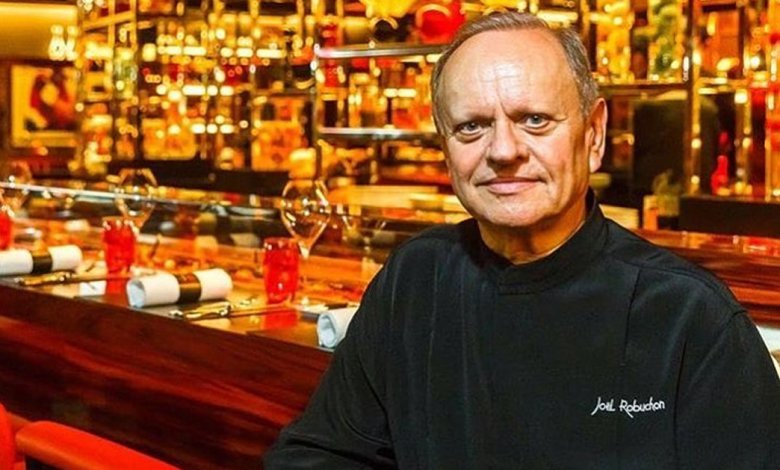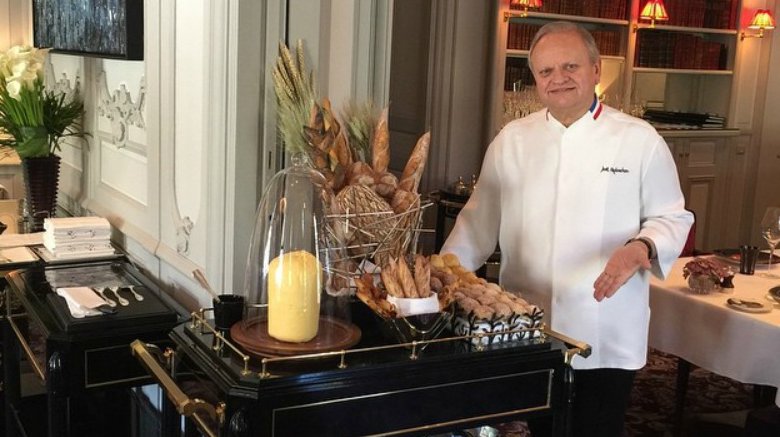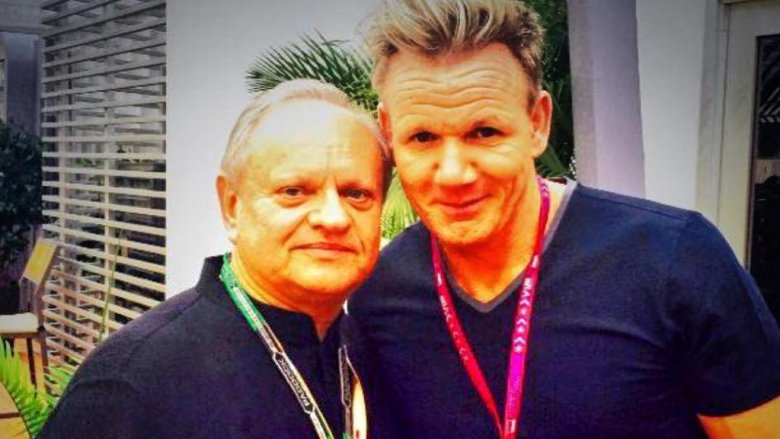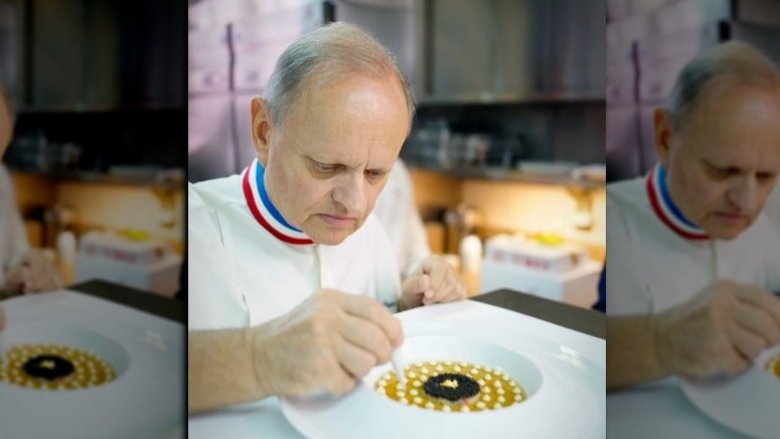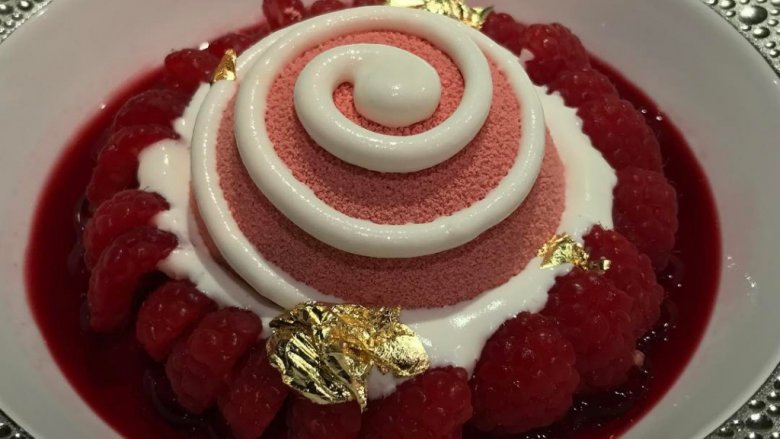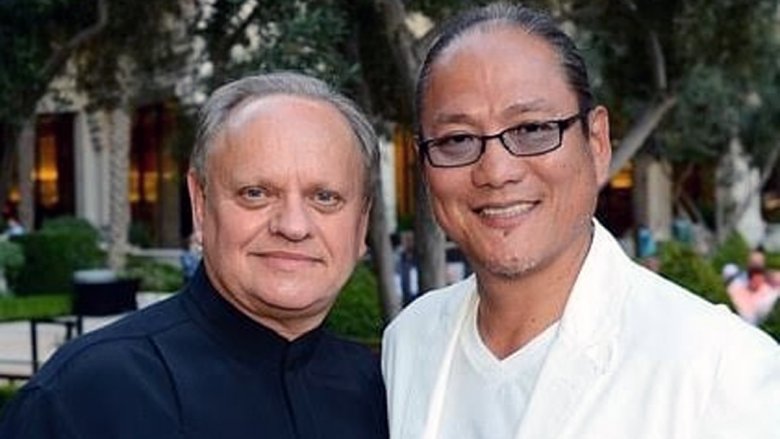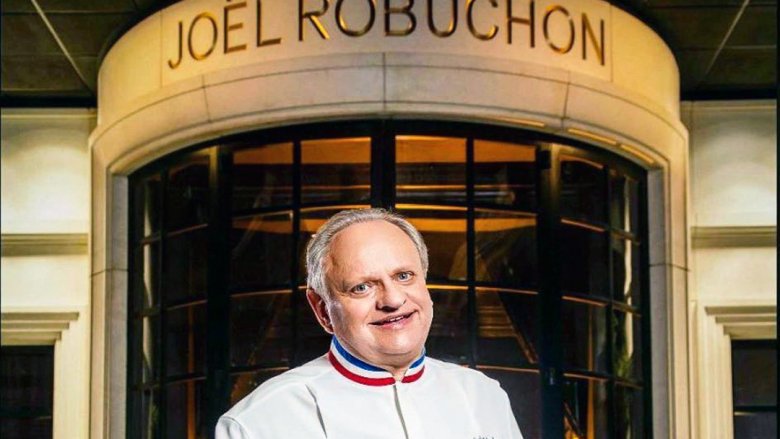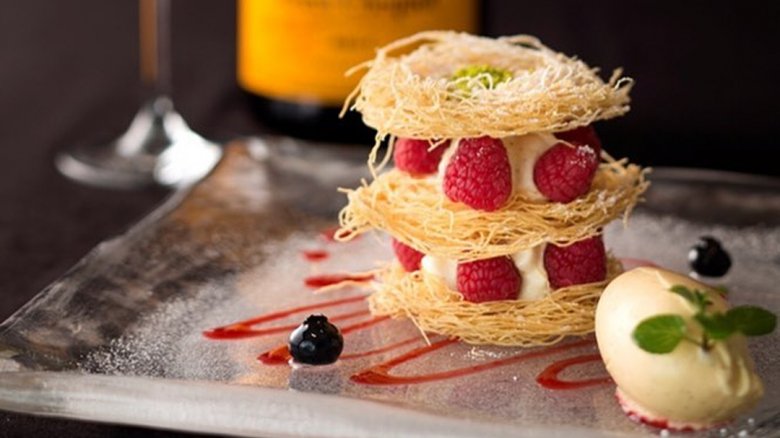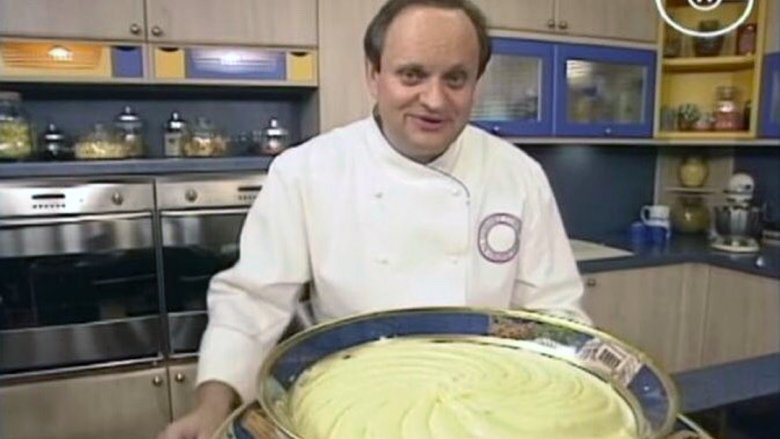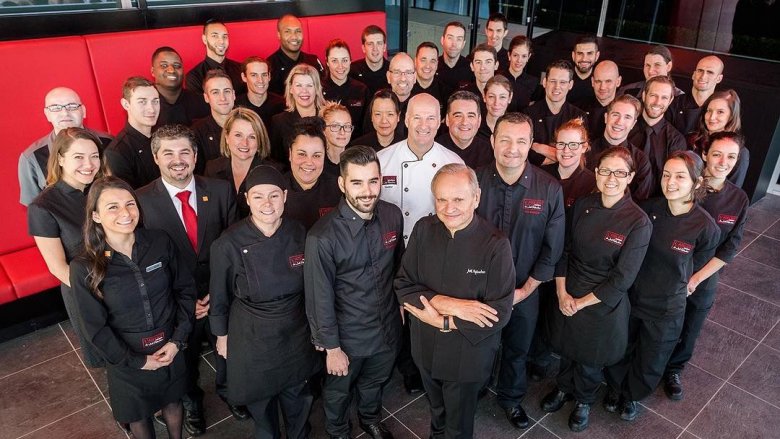The Untold Truth Of Joël Robuchon
When you think of the world's best chefs, your mind likely goes to those you know from TV: Alton Brown, Ina Garten, Emeril Lagasse. You might even ponder Rachel Ray or Guy Fieri — even though neither are actually chefs. While it is indeed true that not everyone's taste buds align, there's no doubt that some chefs just have something extra that makes even the simplest dish completely amazing. Joël Robuchon might not be a name that leaps to your mind when we talk chefs — unless you've eaten at one of his restaurants — but he certainly should.
Robuchon had a way with food, a magical touch that made everything taste better. You know how sometimes people can be so famous they can just coast on their laurels? That wasn't Robuchon. To say he never slowed down is an understatement; he never saw snow until he retired at age 50. The draw of the kitchen was simply too great — his retirement didn't last, and he continued to open restaurants and acquire accolades, right up until he lost his battle with cancer in August 2018. Robuchon wasn't the first celebrity chef, nor the most well-known... he simply was the greatest.
He was almost a priest
Born in April of 1945 while France still fought for their freedom during World War II, Joël Robuchon dreamed of serving bread from a young age. Only he wasn't thinking of running a bakery, but rather becoming a priest. His parents were devout Catholics — he later told Decanter that the ceremonial breaking and blessing of the bread had a lasting effect on his appreciation for food. He viewed meals in a more sacred light, so to speak. Robuchon came from a family of bricklayers, but he still felt a calling to the church and enrolled in a seminary at 12 years old. While working in a seminary kitchen alongside nuns, he realized his true calling would be serving man a different way — by standing over a hot stove.
He soon landed at the Relais of Poitiers Hotel at the tender age of 15 as an apprentice pastry chef. By age 29, he ran the kitchen at Hotel Concorde La Fayette (now known as the Hyatt) in Paris. His reputation just grew from there.
He threw a plate at Gordon Ramsay
Joël Robuchon's influence on great chefs around the world is sublime. Eric Ripert, Nigella Lawson, Masaharu Morimoto, and David Chang all sang his praises upon hearing of his death — Robuchon influenced so many chefs it'd be easier to name those that he didn't touch in some way. His past with Gordon Ramsay, though, is one for the books.
During his early days as a chef, Ramsay worked for Robuchon — and the boss man was not a fan of Ramsay's famously hot temper. As Robuchon recounted to The Telegraph, "I remember it was a dish of langoustine ravioli. He hadn't made it properly. I told him so and Gordon reacted in a very arrogant manner. Although he was very talented, his attitude had always been... difficult." After Ramsay slammed some cookware around and threatened to quit, Robuchon had enough — he sent the plate of food flying right at Ramsay. "That is the only time I've ever thrown a plate at anyone."
The two didn't stay enemies for long, and Ramsay paid a touching tribute to Robuchon on Instagram, but touched on their early relationship by saying Robuchon kept everyone "on our toes! Even when we were sleeping!"
He changed French cooking forever
French cuisine. It's funny how just two words can muster up an image in your head; snooty, nose up in the air, a lot of frowning and cream... that's French cuisine in a nutshell, right? Well, that was French cuisine, to an extent. Even movies depict French cooking as something extravagant and over-the-top. Robuchon changed all that.
The secret to a Joël Robuchon meal was simplicity; he often used only three or four ingredients. Robuchon intended to show off flavors, not mask them. His chicken would be seasoned to focus on the subtle white meat, not smothered in seasonings and unpronounceable sauces. In French cuisine, this was simply absurd; but it worked. From his early days, Robuchon won fans from the fanciest of critics to the regular joes (or Joël's in France). The Meilleur Ouvrier de France is a prestigious award honoring skilled craftsmen in France, and Robuchon won it in 1976. Suddenly, Joël Robuchon was a thing.
His Las Vegas restaurant isn't cheap
Robuchon had restaurants all around the world, but there's one spot that became very popular due to its location — Vegas baby! L'Atelier, the Robuchon's masterpiece in the MGM Grand, has a standard menu with prices that aren't too crazy, but the special menu is what catches everyone's eye.
The restaurant features a tasting menu — small multi-course dishes served at pretty steep prices. L'Atelier, with its shocking red and black decor, promises a dining experience that you (and your wallet) haven't even imagined. The "cheap" summer tasting menu sets you back $145 a person, and the seasonal tasting menu is $225 a person (with an optional wine paring of $125 or $195). Paying $420 a person may seem steep (because it is), but for a once in a lifetime meal, it's an unforgettable experience that's worth its weight in memories.
His Iron Chef days
Thanks to the Food Network, many don't consider a chef truly successful unless he's hosted his own cooking show. Robuchon, however, rose to stardom without the benefit of a camera and a producer in his ear. That doesn't mean he didn't make an occasional appearance on TV, though.
Iron Chef — the original one — didn't treat chefs like they were flipping burgers, they put them on a pedestal — literally! Chairman Kaga knew his stuff, and when it came to pouring on the flowery praise, he super-sized the affection for Joël Robuchon. Iron Chef had Robuchon judge three times during their run. What that meant was (just like with the American version) he would taste the meals and award points based on creativity, taste, and presentation. Iron Chef caught on very early to the Robuchon-is-a-rock-star vibe, even introducing challengers with affirmative quotes from the French master himself. Iron Chef didn't make Robuchon known worldwide, but they certainly let foodies know that he was the undisputed king of the kitchen above all.
Restaurant Jamin
Robuchon made a name for himself soon after upon his arrival to Paris, but an unprecedented culinary achievement etched his name into the annals of cuisine forever. Robuchon opened his own restaurant, Jamin, in 1981. The restaurant received a Michelin star in its very first year in business — quite the rare accomplishment. The very next year Jamin added another star, and was awarded a third star in year three.
Jamin's meteoric rise was inconceivable, but justly deserved. Food critic Andy Hayler, a Michelin star expert, claimed the best meal he ever ate was at Jamin. His simplicity simply worked.
In 1994 he moved Jamin to a larger space and renamed it for himself. That same year the International Herald Tribune awarded it the Best Restaurant in the World. Just two years later, Robuchon shuttered the doors and retired — he noted how many chefs suffer heart attacks in their 50s, and he had just reached that milestone age himself.
Those Michelin Stars
A Michelin star is classification often thrown about when talking restaurants, but what exactly does it mean? They really do visit the restaurants to try the food, though no one will ever know when it happens because the judges are barred from identifying themselves. There's a large amount of controversy surrounding the whole thing, with many arguing the guide hasn't kept up with the times, and some chefs even snubbing the awards for the type of snobby attention they bring. But this much is true — if you have three Michelin stars (the most allotted), you have a pretty darn good restaurant. Joël Robuchon collected Michelin stars like they were Monopoly pieces.
In Michelin history, no one received more stars than his restaurants — including a record 32 in 2016. As the stars can come and go at the whim of the tasters, that number fluctuated. At the time of his passing, he had 31 stars, including five three-star restaurants.
He made a mean potato
Every chef has a signature dish, and Robuchon's might surprise you. He was a country boy at heart, and his dishes, regardless of how fancy, were simplistic at their base. And no one rocked mashed potatoes like Joël Robuchon.
You would assume his mouth-watering dish takes more than boiling the potatoes, peeling them, and adding milk and butter — but that's exactly what it is. Seriously. Even in preparation, Robuchon kept his technique as basic as possible. The supposed secret concoction isn't for the faint of heart — two pounds of potatoes and... wait for it... one pound of cold butter. There's also a pretty good chance you'll burn the daylights out of your fingers; Robuchon learned that by boiling the potatoes whole and peeling them while hot, the steam from the potatoes when mixed with the chilled butter is the trick that makes these potatoes ridiculous. Only Joël Robuchon could take your Aunt Roxie's side dish and earn it three-stars.
He may have been the best chef... ever
How do you measure the greatest ever, at anything? The "Greatest Of All Time" title gets applied to people like Tom Brady in the NFL, and sports writers know that nothing is more clickable than the ole Lebron vs. Jordan NBA GOAT talk. Can we truly decide who the greatest chef ever was? Actually, we can.
You can hate on the Michelin rating as much as you'd like, but Joël Robuchon's consistency is nothing to blink at. His influence on fine dining is unparalleled — given how chefs are rock stars today with their innovative dishes — all those nouveau styles can trace their origin right back to Joël. The Gault et Millau cooking guide named him the chef of the century in 1990, and (spoiler alert) no one came by in the remaining 10 years to knock him off his throne. Robuchon didn't have a cooking show, or host a reality show based on food. All he did was take the simple things that people ate and made them taste amazing. You can have your own personal favorites, but no one can deny that nobody did it like Joël Robuchon — and no one ever will.
